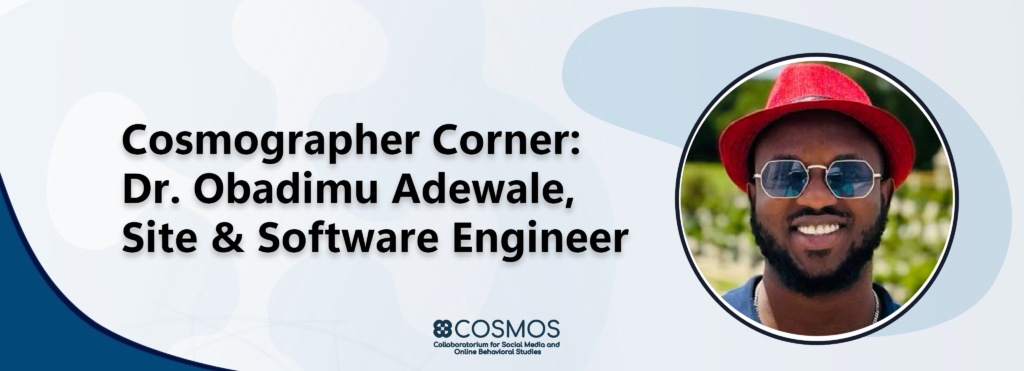COSMOS, in this edition of Cosmographer Corner, highlights the work of former University of Arkansas at Little Rock graduate and Cosmographer Dr. Obadimu Adewale.
Dr. Adewale—who is now the Senior Site Reliability Engineer for Alliant Insurance Services—started his graduate education as a COSMOS research assistant in 2016, quickly rising to challenge as COSMOS’ Lead Software Developer. He received his PhD in Computer Science from UA Little Rock in 2020, and has since held a diverse range of technology positions. We interviewed Dr. Adewale on where his career is now and what his work at COSMOS entailed, with his responses below.
How did COSMOS fit into your university/secondary education career? How did you come across COSMOS, and what were you studying when you joined COSMOS?
My journey with COSMOS began during my pursuit of a Ph.D. in Computer Science, after completing my bachelor’s degree at Obafemi Awolowo University in Nigeria. As I embarked on my doctoral path, I sought out research laboratories that aligned with my interests and aspirations. Dr. Agarwal’s pioneering work and the vibrant atmosphere of innovation at COSMOS immediately caught my attention. The laboratory’s reputation for cutting-edge research, coupled with its extensive collaborations with governmental and non-governmental organizations, appealed to my ambition to make meaningful contributions to the field. Additionally, I was drawn to COSMOS by its emphasis on scholarly dissemination, as evidenced by the encouragement given to researchers to publish and present their findings at prestigious conferences and journals. Joining COSMOS felt like stepping into a dynamic ecosystem where my passion for computer science could flourish amidst groundbreaking research endeavors.
How would you describe the “research pipeline” that you worked on while at COSMOS? In other words, what was the specific area in which you researched?
During my tenure at COSMOS, I delved into the realm of social media analysis, particularly focusing on toxicity dynamics. Collaborating with esteemed colleagues, I discerned a significant gap in the understanding and mitigation of toxic content proliferating across online platforms. My research endeavors concentrated on unraveling the multifaceted nature of toxicity dissemination and on scrutinizing the divergent narratives propagated by different factions, such as pro-NATO and anti-NATO entities. Employing sophisticated epidemiological models and leveraging insights from social media studies, I endeavored to elucidate the mechanisms driving the propagation of toxicity within digital ecosystems. My work aimed not only to shed light on the intricate dynamics of online discourse but also to furnish actionable insights for fostering healthier online environments.
Since leaving COSMOS, what roles/positions/jobs have you had? What is your current work?
Following the culmination of my Ph.D. journey in 2020, I embarked on a professional trajectory marked by diverse experiences in the technology industry. Initially, I joined LinkedIn as a Site Reliability Engineer, where I honed my expertise in ensuring the robustness and scalability of digital platforms. Subsequently, seeking fresh challenges and opportunities for growth, I transitioned to Diligent Robotics as a Platform Engineer. In my current role, I am instrumental in architecting and optimizing the infrastructure underpinning innovative robotic solutions. My tenure at COSMOS endowed me with a rich reservoir of analytical and problem-solving skills, which have proven instrumental in navigating the dynamic landscape of technology-driven enterprises.
What positions did COSMOS and your classes at UALR best prepare you for?
While my current role may not directly mirror the research pursuits I engaged in at COSMOS, the invaluable skills and insights gleaned from my time at the laboratory have been indispensable in shaping my professional journey. The rigorous academic curriculum and research-oriented ethos at COSMOS instilled in me a penchant for critical thinking and a methodical approach to problem-solving. These foundational competencies have equipped me with the resilience and adaptability required to excel in diverse roles and environments within the technology sector. Whether grappling with complex engineering challenges or navigating interdisciplinary collaborations, the intellectual toolkit cultivated at COSMOS continues to serve as a cornerstone of my professional endeavors.
If you had to describe the most momentous event at COSMOS, what would it be?
Reflecting on my tenure at COSMOS, one particular milestone stands out as profoundly significant—the opportunity to present my research at the SBP-BRiMS conference in Washington D.C. alongside fellow cosmographers. This seminal event not only afforded me the platform to showcase our collective endeavors but also facilitated invaluable exchanges of ideas and insights with esteemed peers and domain experts. The experience of disseminating our findings amidst the backdrop of a prestigious international conference remains etched in my memory as a testament to the transformative impact of collaborative scholarship and the boundless potential of interdisciplinary research endeavors.
What advice would you have for current Cosmographers?
To my fellow cosmographers embarking on their academic and professional journeys, I offer the following counsel: cultivate diligence, perseverance, and a relentless pursuit of excellence. Embrace opportunities for intellectual growth and scholarly engagement, whether through active participation in conferences, publication endeavors, or interdisciplinary collaborations. Stay attuned to emerging trends and research paradigms within the ever-evolving landscape of social computing, leveraging your expertise to address pressing societal challenges and effect positive change. Remember, the journey of scholarly inquiry is fraught with challenges and uncertainties, but with steadfast dedication and a commitment to lifelong learning, success is not merely an aspiration but an inevitable outcome.

